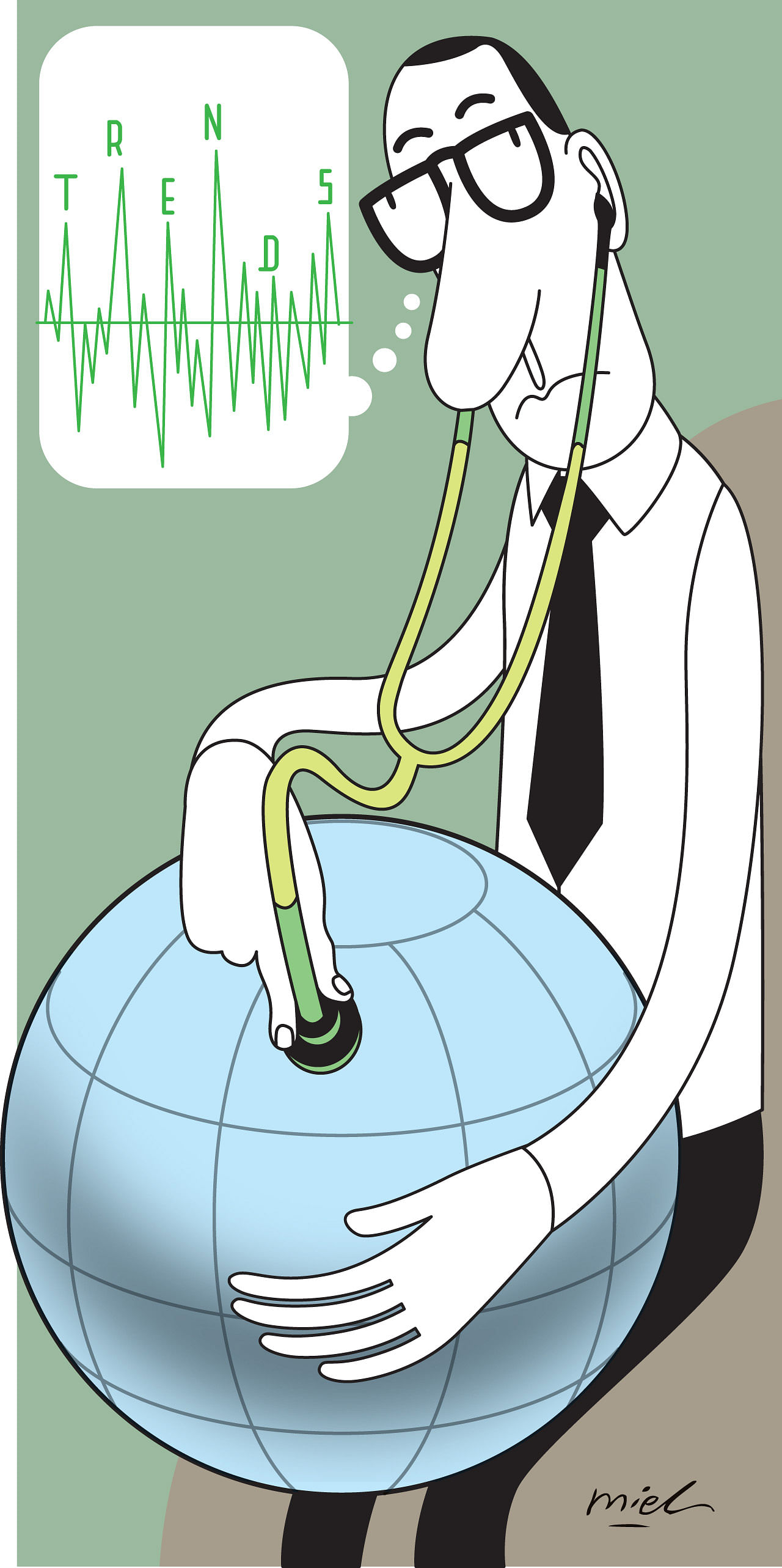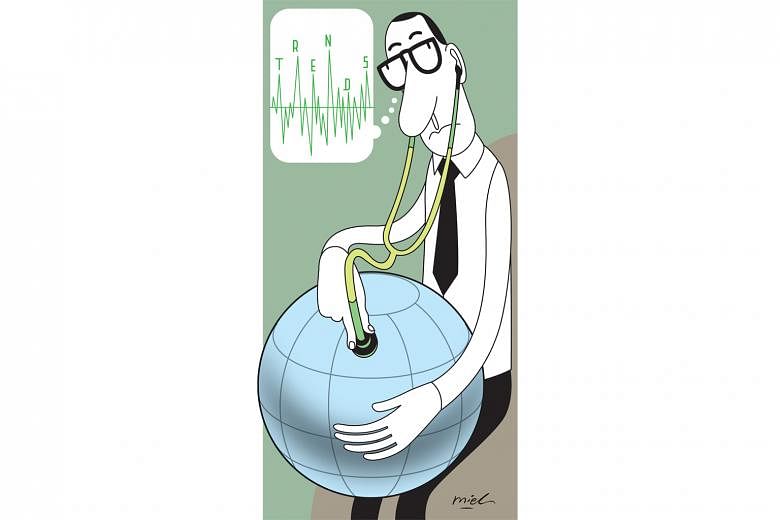The Covid-19 pandemic will be the defining issue of 2020. What changes in economic thinking and behaviour will it trigger? Here are eight possibilities.
A pivot to multilateralism
International institutions such as the World Health Organisation (WHO), International Monetary Fund (IMF) and the World Bank had been all but marginalised, especially since the Trump administration came into office in the United States in 2017, harbouring a deep suspicion of multilateralism.
With the pandemic, these organisations are coming back into their own. They are especially critical for poor countries that lack the resources or expertise to cope with the impact of the pandemic.
The WHO is in the news every day. After a slow start in its response to the pandemic (which it declared only on March 11, long after it had spread far and wide), it has established itself as a trusted source of information, expertise as well as medical supplies, including test kits.
The IMF is providing debt relief to poor countries and is readying to mobilise US$1 trillion (S$1.4 trillion) in loans to help its members fight the pandemic. The World Bank Group has also pledged US$150 billion in financial support over the next 15 months. There is now a growing appreciation for the role of these multilateral agencies.
The reshaping of supply chains
Global supply chains are being reshaped. This process had already started during the US-China trade war as companies tried to circumvent US tariffs, but it will now accelerate. The emphasis will shift away from optimising efficiency - for example, through just-in-time input supplies - to optimising resilience, through a diversification of supply sources, additions to inventories and some reshoring of production.
The Covid-19 outbreak has taught the world some hard lessons about supply chains.
For example, China is the world's largest supplier of medical protective gear. The interruption of its exports because of the initial outbreak led to major supply shortages which left health workers elsewhere dangerously exposed.

The car industry also suffered badly from a shortage of parts, many of which were made in Wuhan, a major auto-parts manufacturing hub. China is also a major supplier of active pharmaceutical ingredients for drug production, which was also disrupted.
The diversification of supply chains and additions to inventory will have both positive and negative effects. On the plus side, it would lead to more investment in parts of the world other than China, such as South and South-east Asia and Mexico. But it would also lead to higher costs, as many production locations cannot match China's cost-efficiencies.
The need to hold more inventories will also add to costs.
Unlimited money and big budget deficits
With economies facing collapse, governments have pulled out all the monetary and fiscal stops. The goal is to keep companies alive and workers employed as far as possible to prevent long-term damage to economies, so that they can recover when the pandemic passes.
This will be hugely costly, but in the circumstances, money is no object. As the governor of the Bank of Canada, Mr Stephen Poloz, put it: "Nobody ever accuses a firefighter of using too much water."
So there are now no limits to monetary easing or government spending. The United States, the euro zone, Japan, Britain, China, Canada and Singapore, among other countries, have rolled out massive economic stimulus packages. Budget deficits are going to blow out around the world.
How will the deficits be financed?
In Singapore's case, it is being done by drawing on past reserves. But in many other countries, the deficits are being monetised by central banks, which are printing money to buy government bonds.
This is essentially what so-called Modern Monetary Theory (MMT) prescribes. Its main message is that there should be no financing restrictions in countries that have their own currencies, and in a recession, governments must offset the deficits of the private sector, however big they are; the priority is to balance economies, not to balance budgets.
MMT, advocated by a small minority of economists, was until recently considered heretical. But it has now gone mainstream. This is a major change in economic thinking.
Will massive deficits and debt lead to inflation? They didn't after World War II, and they haven't in Japan, which has been monetising deficits for years and has a national debt approaching 250 per cent of gross domestic product.
But what happens in the years after the pandemic - which is both a supply and demand shock - remains to be seen.
Stronger social safety nets
The Covid-19 pandemic will, or at least should, highlight the importance of social safety nets, such as unemployment insurance, universal healthcare, workers' compensation and paid sick leave.
This pandemic will lead to mass layoffs in many countries as well as rising inequalities. The costs of social distancing will also mount, directly impacting millions of workers in jobs that require human contact, such as healthcare workers, taxi drivers, customer-facing staff and daily-wage workers, who do not have the luxury of working from home and who often live pay cheque to pay cheque and have little or no savings.
It will dawn on governments that minimum social safety nets are essential to protecting such workers, by easing the pain of layoffs and enabling them to avoid being forced to work. Demands for universal healthcare, in particular, will grow.
More investments in public health
The pandemic has also underlined the importance of investing in public health. If any segment of society is especially vulnerable to the outbreak, that makes all of society more vulnerable.
Health inequality is also a hazard. Viruses, like other sources of infectious disease, do not discriminate between rich and poor. An outbreak that starts in a slum, for instance, will not be confined to the slum.
The recognition will grow that public health services that are weak on preventive measures such as basic sanitation and environmental standards are a threat to the personal health of everyone. The Covid-19 pandemic will be a wake-up call to countries that have under-invested in public health.
A remote communications boom
Remote communication technologies are booming. Especially among white-collar workers, remote work has become the norm. A poll of more than 800 companies by consulting firm Gartner in the middle of last month revealed that 88 per cent of companies now encourage or require employees to work from home.
With business travel also interrupted, many companies have introduced new tools for virtual meetings such as Google Hangouts, GoToMeeting and Zoom.
Telemedicine, until recently on the fringes of medical practice, is also taking off. Many clinics, especially in advanced economies, have launched telemedicine services, enabling some sick people to stay home and still get treatment - not only for Covid-19, but also other illnesses.
Hospitals have started using "tele-ICUs" - two-way bedside videos which connect intensive care unit patients with doctors and nurses in a remote location, who can monitor their progress.
In the US, the US$2 trillion stimulus package also includes financial support for telehealth services as well as an easing of restrictions on their use.
In Singapore, there are 11 telemedicine providers, some of which provide 24/7 consultations via video by licensed practitioners, can prescribe medicines and issue medical certificates.
Other sectors are also relying increasingly on remote communication technologies. In the education sector, schools and universities have switched to online learning platforms. Conferences are being reconfigured as digital summits. More entertainment and cultural experiences are being delivered digitally, including theatre shows and tours of museums.
Although remote communication technologies have their drawbacks, when the pandemic passes, it is unlikely that people will abandon them and revert to the status quo ante. Their acceptance will have spread, both among users and organisations.
There will also be innovations that make them more user-friendly and powerful. The greater use of these technologies will have implications for several sectors of the economy, including office real estate, business travel, the educational and medical sectors, and the Mice (meetings, incentives, conferences and exhibitions) industry.
A mixed impact on e-commerce
It is tempting to believe that social distancing measures and stay-home advisories associated with Covid-19 will spur the growth of e-commerce as shoppers avoid visiting retail stores, restaurants and bars.
The severe acute respiratory syndrome outbreak of 2003 proved to be a boost to e-commerce, catalysing the growth of China's e-commerce giants such as Alibaba and JD.com.
However, the Covid-19 outbreak is more serious, widespread and disruptive. The evidence so far relating to its impact on e-commerce is mixed.
Research by consumer tracking firm Nielsen and Europe's national e-commerce associations indicate that while the demand for certain categories of goods - such as groceries, medicines and personal hygiene products - has soared, e-commerce activity related to a range of other goods and services, including consumer durables, fashion, luxury goods, airlines and hotels, has plummeted.
Overall, revenues are down because of lower demand, business closures and difficulties in fulfilling orders. But some long-time purchasing habits may permanently change. Nielsen's China office reports, for instance, that people who had not embraced online shopping are now doing so and may not revert to their old habits.
A boost for climate change activism
The spread of Covid-19 brings into sharp relief the fact that from time to time, the world will face collective dangers. Pandemics are but one example. Climate change is another that has the potential to trigger catastrophes on a global scale. There will also be a growing realisation that the two are not unrelated.
The transmission of viruses from animals to humans is partly the result of deforestation and the loss of biodiversity, which have driven animals out of their natural habitats and closer to human populations, increasing the chances of cross-species contagion.
The United Nations Intergovernmental Panel on Climate Change has also warned that global warming is likely to accelerate the emergence of new viruses. The wildlife trade, which China has now banned but which is still prevalent in other countries, is also a hazard.
One of the silver linings of the Covid-19 pandemic is that it will create greater consciousness of climate change as an existential threat to the world.












